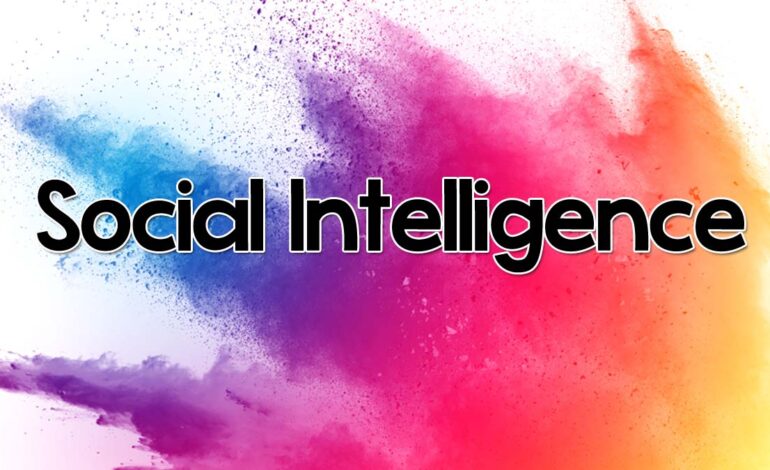
Unlocking the power of social intelligence has become a game-changer for businesses in today’s hyper-connected world. In an era where customer preferences and market trends evolve at lightning speed, having the ability to tap into the wealth of insights and opportunities offered by social media is imperative.
Social intelligence goes beyond simply monitoring likes and shares; it encompasses understanding consumer behavior, anticipating market shifts, and making informed decisions that drive business success. So, buckle up as we delve into the fascinating realm of social intelligence and discover how it can elevate your business performance to new heights!
Defining Social Intelligence
Social intelligence is the ability to gather and interpret social data from various digital platforms, enabling businesses to gain valuable insights into consumer behavior, market trends, and brand sentiment. It goes beyond mere social media monitoring; it involves analyzing vast amounts of data to uncover patterns and extract actionable information.
At its core, social intelligence is about understanding people. It’s about deciphering the underlying motivations behind their actions and conversations online. By tapping into this wealth of information, businesses can make informed decisions that align with customer needs and preferences.
One key aspect of social intelligence is sentiment analysis. This involves analyzing user-generated content to determine whether sentiments expressed towards a brand or product are positive, negative, or neutral. Understanding how customers feel about your business can help you identify areas for improvement or seize opportunities for innovation.
Another crucial element of social intelligence is competitor analysis. By monitoring the activities and strategies of your competitors on social media platforms, you gain invaluable insights into their strengths and weaknesses. This knowledge can inform your own marketing campaigns and enable you to differentiate yourself in the marketplace.
In essence, social intelligence empowers businesses by providing them with a deeper understanding of their target audience as well as the competitive landscape they operate in. It enables companies to adapt quickly to changing trends and stay ahead in an increasingly dynamic business environment where customer demands reign supreme.
Read more articles on Owego Treadway
The Business Benefits of Social Intelligence
Businesses today operate in a highly interconnected world, where social interactions and relationships play a crucial role. In this context, social intelligence has emerged as a key factor that can elevate business performance to new heights. But what exactly is social intelligence? It refers to the ability to understand and navigate complex social dynamics effectively, both within the organization and externally with customers, partners, and stakeholders.
One of the primary benefits of having strong social intelligence is improved communication. By understanding others’ perspectives and emotions, businesses can tailor their messaging for maximum impact. This leads to more effective marketing campaigns, better customer service experiences, and stronger relationships with clients.
Another advantage of social intelligence is enhanced collaboration within teams. When individuals possess high levels of social awareness, they are better equipped to manage conflicts, build trust among team members, and foster an inclusive work environment. This ultimately results in increased productivity and innovation.
Emotional intelligence enables individuals to regulate their own emotions while empathizing with others’. This skill set not only contributes positively towards employee well-being but also helps create a positive workplace culture where creativity flourishes.
How to Develop Social Intelligence
Developing social intelligence is crucial for individuals and businesses alike. It involves understanding and effectively navigating social interactions, emotions, and relationships. Here are some tips on how to cultivate this essential skill.
1. Active Listening: Pay attention to verbal and nonverbal cues when engaging in conversations. Truly listen to others without interrupting or formulating responses in your mind.
2. Empathy: Put yourself in others’ shoes to understand their perspectives, feelings, and needs better. This will help you respond with compassion and build stronger connections.
3. Emotional Awareness: Be mindful of your own emotions as well as those of others around you. Recognize how emotions influence behavior and learn to manage them appropriately.
4. Nonverbal Communication: Master the art of body language, facial expressions, gestures, and tone of voice to convey messages effectively and interpret them accurately.
5. Flexibility: Adapt your communication style based on the situation at hand while maintaining authenticity. Understand that different people have diverse communication preferences.
6. Conflict Resolution Skills: Learn effective techniques for resolving conflicts constructively by encouraging dialogue, seeking compromise, and finding mutually beneficial solutions.
7. Cultural Sensitivity: Respect cultural differences by familiarizing yourself with various customs, beliefs, values, traditions prevalent among diverse groups of people.
By consistently practicing these skills over time through self-reflection and learning from experiences , you can enhance your social intelligence significantly – a valuable asset both personally and professionally.








